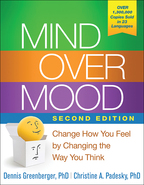
|
Online resources for purchasers of Mind Over Mood: Second Edition: Change How You Feel by Changing the Way You Think, by Dennis Greenberger and Christine A. Padesky.
¿Busca la página web que complementa la edición en español?
|
Worksheets
Download a PDF of all of the worksheets in the book, or download each worksheet individually below:
Reading Guides
Mind Over Mood can be customized so that you can read chapters in the order that is likely to be most helpful for you. Reading Guides for specific moods outline the authors' recommended sequence for reading the chapters of the book. These recommendations are based on research that shows which skills are most helpful for particular moods.
If you are using Mind Over Mood as part of therapy, your therapist may suggest you use the worksheets in a particular sequence. If you have questions about when and how to utilize the worksheets, please ask your therapist.
|
|
Sign up for emails with the latest information about The Clinician’s Guide to CBT Using Mind Over Mood, Second Edition and other Mind Over Mood news. |

|
Dennis Greenberger, PhD, a clinical psychologist, is the founder and Director of the Anxiety and Depression Center in Newport Beach, California. He is a past president and Founding Fellow of the Academy of Cognitive Therapy (ACT), and has practiced cognitive-behavioral therapy for more than 30 years. His website is www.anxietyanddepressioncenter.com. |

|
Christine A. Padesky, PhD, a clinical psychologist, is the cofounder of the Center for Cognitive Therapy in Huntington Beach, California, the coauthor of five books, and an internationally renowned speaker. She is a recipient of the Aaron T. Beck Award for significant and enduring contributions to the field of cognitive therapy from the ACT and the Distinguished Contribution to Psychology Award from the California Psychological Association. Her website is www.mindovermood.com. |
Purchasers of this book have permission to copy worksheets and boxes, where indicated by footnotes, for personal use or use with individual clients. These worksheets and boxes may be copied from the book or accessed directly from the publisher’s website, but may not be stored on or distributed from intranet sites, internet sites, or file sharing sites, or made available for resale. No other part of this book may be reproduced, translated, stored in a retrieval system, or transmitted, in any form or by any means, electronic, mechanical, photocopying, microfilming, recording, or otherwise, without written permission from the publisher.
